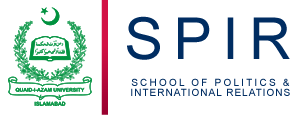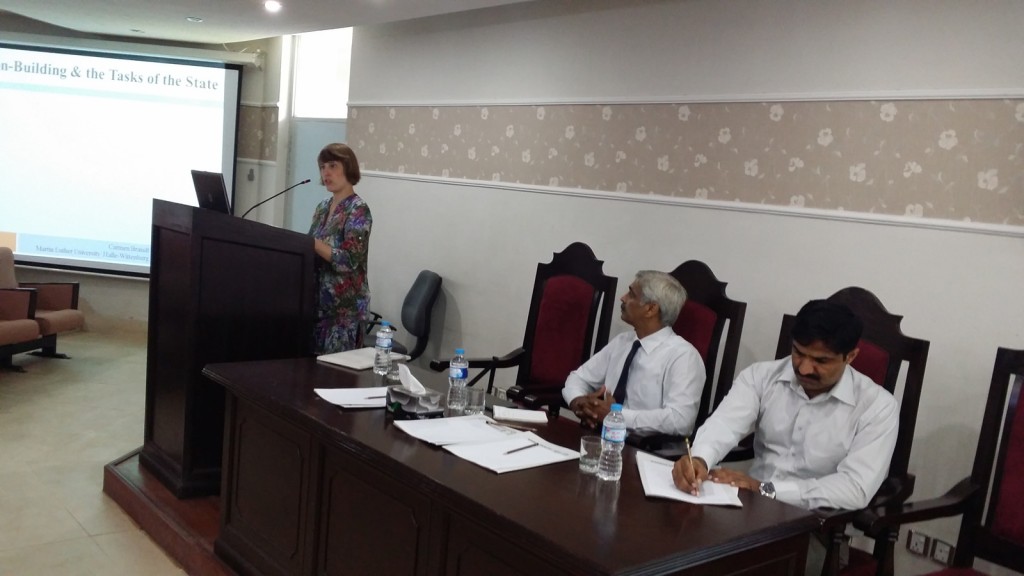Dr. des. Carmen Brandt of South Asia Section of the Institute for Oriental Studies, Martin Luther University Germany, visited School of Politics and International Relations, Quaid-i-Azam University Islamabad on September 11, 2014. She was welcomed by Dr Zafar Nawaz Jaspal, director SPIR. After the introduction, Dr Muhammad Nadeem Mirza highlighted the importance of the SPIR Lecture Series, and the issue of language politics in Pakistan, noting that language as identity or as part of the identity can serve as a tool to unite the nation, but if not dealt prudently it has the potential to divide a nation. Dr Noman Omar Sattar, of Area Study Centre for Africa, South & North America, was also present on the occasion and enlightened the audience about his views about the issue.
Dr Brandt, being an expert of the language politics in South Asia, talked about the role languages play in the nation’s building. She specifically talked about the Chakma and Meitei languages. Here is a resumé of her talk:
While the 19th and 20th centuries witnessed a wide standardisation of writing systems in South Asia leading to some scripts vanishing, recently various small language communities have discovered that a distinct script could serve as an important identity marker and help to demarcate their language, particularly if endangered, from surrounding dominant languages. Though endeavours to implement newly invented scripts for languages which can look back solely on an oral literary tradition have been only marginally successful, small language communities which can provide evidence of an old literary tradition in an own script seem to have been more successful in establishing their distinct script.
This paper will give a comparative overview on the recent challenges surrounding two languages which are today largely written in the script predominantly identified with the Bengali and Assamese languages. In order to escape the perceived domination of these, particularly Bengali, a host of activists with diverse backgrounds have been trying for the last decades to revive old scripts for Chakma, a minority language spoken mainly in the south-east of Bangladesh, and Meitei (today officially Manipuri), the dominant language in the Indian state of Manipur.
Owing to different geopolitical settings, the endeavours to revive these old scripts encounter diverging obstacles and support. Whereas Meitei and its distinct script, the Meitei Mayek, enjoy the overwhelming support of the government of actually multilingual Manipur and are increasingly being perceived as a threat to minority languages, including Bishnupriya Manipuri, claimed by many speakers of this to be the actual Manipuri, Chakma and its script rather depend on activities by non-governmental organisations (NGOs) which centre around indigenous rights discourses and the preservation of minority cultures in Bengali dominated Bangladesh.
Based on recent fieldwork in Bangladesh and Manipur, this paper will not only discuss the open and hidden agendas of supporters for these script revival movements, but, additionally, the various steps taken for the implementation of these revived scripts, the present state of these languages and their scripts and, above all, attitudes of common people towards these recent changes. The two examples of Chakma and Meitei will illustrate that today the shift in writing systems in South Asia denotes much more than the representation of phonemes in a more accurate way, or a standardisation of language and script in order to encounter challenges emerging from the aim to educate and literate a linguistically heterogeneous population. Hence, while script reformations and transformations in the past often served agendas of inclusion, today’s script revivals in South Asia rather lead to the opposite — to the exclusion of groups and individuals. This seems to apply not only for the language groups in question with regard to other languages in the same region, but also to speakers of the ingroup depending on whether these have command over the recently revived script or not.

